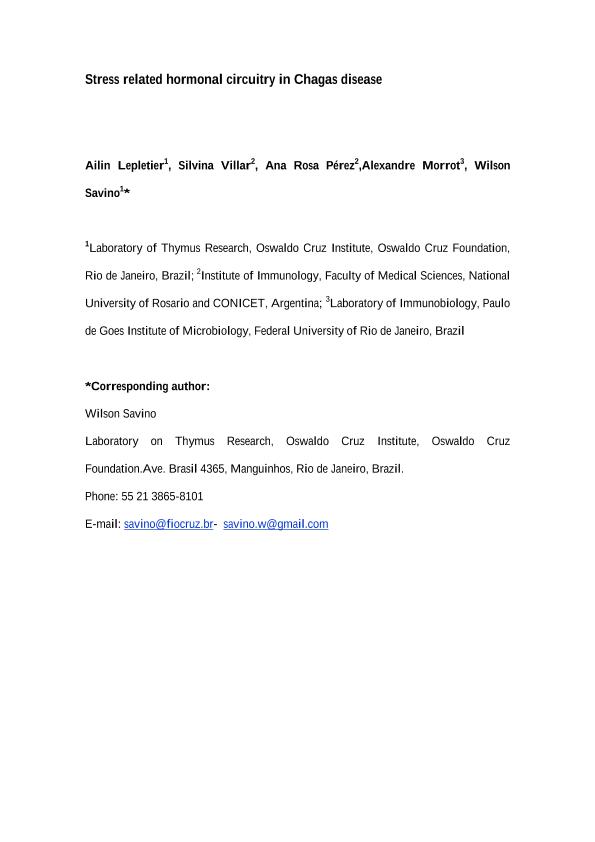Mostrar el registro sencillo del ítem
dc.contributor.author
Lepletier, Ailin
dc.contributor.author
Villar, Silvina Raquel

dc.contributor.author
Perez, Ana Rosa

dc.contributor.author
Morrot, Alexandre
dc.contributor.author
Savino, Wilson
dc.date.available
2020-01-20T19:05:13Z
dc.date.issued
2014-07
dc.identifier.citation
Lepletier, Ailin; Villar, Silvina Raquel; Perez, Ana Rosa; Morrot, Alexandre; Savino, Wilson; Stress related hormonal circuitry in chagas disease; IOS Press; Advances in Neuroimmune Biology; 5; 2; 7-2014; 91-98
dc.identifier.issn
1878-948X
dc.identifier.uri
http://hdl.handle.net/11336/95259
dc.description.abstract
During stressful processes, for example infectious diseases, neuroendocrine and immune networks act multi-directionally facilitating the host response. However in exacerbated settings, this homeostatic mechanism may be lost. Recent findings unravelled an imbalance of the immunoneuroendocrine network during Chagas disease, the infection caused by the protozoan Trypanosoma cruzi. During the acute immune response against T. cruzi, inflammatory and neuroendocrine responses become dysregulated with harmful effects for the host. One target organ is the thymus. In acutely-infected mice, it undergoes a severe atrophy, with massive depletion of immature double positive CD4+CD8+ (DP) thymocytes, which seems to be linked to a systemic and intrathymic cytokine/hormonal imbalance, involving TNF-α, glucocorticoids and prolactin. In addition, there is an abnormal export of potentially autoreactive DP cells to the periphery of the immune system, which is apparently regulated by the prolactin levels. Furthermore, TNF-α is able to differentially modulate the hypothalamus-pituitary-adrenal (HPA) axis: while having stimulatory effects at the HP unit at the adrenal it is inhibitory. Interestingly, chronically infected humans with chagasic myocardiopathy also showed alterations in HPA axis. Understanding of how T. cruzi infection lead to neuroendocrine immune-associated disturbances will provide important clues to better dissect the mechanisms underlying the pathophysiology of Chagas disease.
dc.format
application/pdf
dc.language.iso
eng
dc.publisher
IOS Press

dc.rights
info:eu-repo/semantics/openAccess
dc.rights.uri
https://creativecommons.org/licenses/by-nc-sa/2.5/ar/
dc.subject
CHAGAS DISEASE
dc.subject
DOUBLE POSITIVE T CELLS
dc.subject
HORMONAL CIRCUITRY
dc.subject
LYMPH NODES
dc.subject
THYMUS ATROPHY
dc.subject.classification
Inmunología

dc.subject.classification
Medicina Básica

dc.subject.classification
CIENCIAS MÉDICAS Y DE LA SALUD

dc.title
Stress related hormonal circuitry in chagas disease
dc.type
info:eu-repo/semantics/article
dc.type
info:ar-repo/semantics/artículo
dc.type
info:eu-repo/semantics/publishedVersion
dc.date.updated
2020-01-10T14:57:31Z
dc.identifier.eissn
1878-9498
dc.journal.volume
5
dc.journal.number
2
dc.journal.pagination
91-98
dc.journal.pais
Estados Unidos

dc.description.fil
Fil: Lepletier, Ailin. Instituto Oswaldo Cruz; Brasil
dc.description.fil
Fil: Villar, Silvina Raquel. Consejo Nacional de Investigaciones Científicas y Técnicas. Centro Científico Tecnológico Conicet - Rosario; Argentina. Universidad Nacional de Rosario. Facultad de Ciencias Médicas. Instituto de Inmunología; Argentina
dc.description.fil
Fil: Perez, Ana Rosa. Consejo Nacional de Investigaciones Científicas y Técnicas. Centro Científico Tecnológico Conicet - Rosario; Argentina. Universidad Nacional de Rosario. Facultad de Ciencias Médicas. Instituto de Inmunología; Argentina
dc.description.fil
Fil: Morrot, Alexandre. Universidade Federal do Rio de Janeiro; Brasil
dc.description.fil
Fil: Savino, Wilson. Instituto Oswaldo Cruz; Brasil
dc.journal.title
Advances in Neuroimmune Biology
dc.relation.alternativeid
info:eu-repo/semantics/altIdentifier/url/https://content.iospress.com/articles/advances-in-neuroimmune-biology/nib140094
dc.relation.alternativeid
info:eu-repo/semantics/altIdentifier/doi/http://dx.doi.org/10.3233/NIB-140094
Archivos asociados
